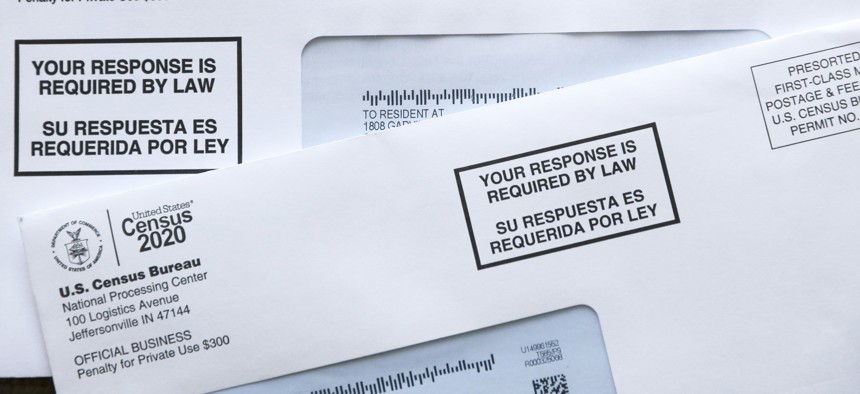Connecting state and local government leaders
On Census Day, April 1, about 38% of households have responded to the decennial questionnaire, a lower rate than at this point in 2010.
Local leaders and community organizations from across the country had expected to hold rallies and education campaigns on Wednesday—Census Day—to get residents fired up about the 2020 decennial count.
But as the coronavirus outbreak put the kibosh on large gatherings, organizers have had to rethink how they conduct census outreach. Many turned to digital marketing campaigns on Wednesday instead, hosting Twitter chats or posting online ads to encourage people to complete their census forms.
Fewer people have completed the 2020 census at this point in the count than had in 2010, raising concern that the pandemic could be negatively impacting response rates. About 38% of households had responded to the 2020 as of March 31, compared to 54% in 2010, said Census Bureau spokesman Michael Cook.
The Census Bureau is relying on more than 300,000 nonprofits, businesses, local governments and civic groups to help boost participation in their communities. But many of the planned efforts have been sidelined as a result of the pandemic outbreak.
The Leadership Conference Education Fund’s Census Counts campaign had to cancel events originally scheduled Wednesday in five states. Instead, the group is strategizing to work with essential services and businesses that are still open to distribute educational materials in local communities, said spokeswoman Tamika Turner.
Because this year’s census is the first count that will enable the majority of respondents to complete questionnaires online, digital outreach has always been a key component of the game plan, Turner said.
“But we had to shift our strategies to make sure we kept people safe,” she said. “We are redirecting resources toward more paid media and also working with essential services because we know that is where people are going to be congregating.”
New outreach plans could include distributing census brochures to grocery stores or doctors’ offices, or even partnering with local restaurants to place census pamphlets in to-go bags, she said.
The census is conducted once every decade and has implications for congressional representation and the flow of billions of federal dollars to states. An undercount of residents could reduce the amount of federal funding that a local community receives.
In addition to altering procedures to deal with public health concerns, community groups also face difficulties getting residents who are skeptical of the federal government to answer the questionnaires. Many immigrant communities’ concerns about the census stem from the Trump administration’s efforts to include a citizenship question on the 2020 census (the question was not ultimately included).
With census participation rates generally on the decline over the last decade, Cook said the bureau had projected a 40% response rate for Census Day this year, meaning it isn’t too far off of its goal. But the coronavirus has affected the way census workers do their job and the bureau has had to make some adjustments as a result.
Door-to-door visits from census workers are on hold until at least April 15 in an effort to limit the spread of the novel coronavirus. With colleges and universities closed, the bureau is conducting extra outreach to students to make sure they fill out forms representing where they would have lived on April 1 rather than where they are currently residing, Cook said. The bureau has also pushed back by two weeks the self-response deadline, which is now August 15.
Any households that do not respond by April 8 will be mailed questionnaires, Cook said.
With extended reply deadlines and more reminder mailings to come, Steven Romalewski, the director of mapping services at the City University of New York, said it’s too early to determine to what extent the pandemic could negatively affect response rates—particularly in hard-to-count communities.
“A lot more people are home and maybe they have a little more time to look at their mail and not ignore it,” Romalewski said. “On the other hand, thousands and thousands of census stakeholders had all planned to do get-out the-count campaigns face-to-face in large groups and that is all out the window. They will have to quickly pivot to phone banks and mailings and social media.”
The changes the bureau has already made to support its mostly online operation this year could be helpful in encouraging residents to fill out surveys in the coming months, Romalewski said.
In 2010, the Census Bureau sent most households two mailings about the count, including a physical questionnaire, he said. This time around, the bureau will send out as many as five mailings to remind residents.
“These reminder mailings will hopefully be a big help,” Romalewski said.

NEXT STORY: Under Pressure, Florida Governor Finally Orders Residents To Stay Home



